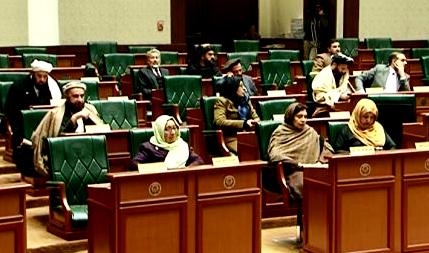Latest News
Senators Suggest Termination of US-Afghan Pact

 A number of Afghan senators on Sunday accused the United States of America for playing a dual policy against Afghanistan in regard to bringing peace and stability to the war-torn country.
A number of Afghan senators on Sunday accused the United States of America for playing a dual policy against Afghanistan in regard to bringing peace and stability to the war-torn country.
The House of Elders suggested that Afghanistan should review or cancel the Bilateral Security Agreement (BSA) signed between Kabul and Washington after a National Unity Government deal brokered by the U.S. in 2014.
“If you want to rescue our people from this misery let’s unconditionally terminate this agreement in coordination with the House of the People,” said Rahmatullah Achekzai a senate member from Kandahar province.
“There is lack of a specific strategy in our foreign policy. If the process continues, Afghanistan will become the battlefield of superpowers where its people will be sacrificed only,” said Amena Afzali another senate member from Herat province.
At the same time, the Speaker of the Upper House of Parliament emphasized that U.S. is not loyal to Afghanistan and has failed to implement its promises to stabilize the country.
“The security agreement was not implemented as the people of Afghanistan expected. The agreement was endorsed by both Houses [Afghan Parliament] and was ratified by the President. According to the procedure, if someone has any consideration this [agreement] should be advised by a two-third of vote in the House,” said Fazel Hadi Muslimyar, the Speaker of the Upper House of Parliament.
Afghanistan and the United States signed the BSA through U.S. Ambassador James B. Cunningham and Afghan national security advisor Mohammad Hanif Atmar on September 30, 2014 to allow U.S. military presence in Afghanistan beyond 2014. The BSA went into force on January 1, 2015 and remains in force “until the end of 2024 and beyond” unless it is terminated by either side with two years’ notice.
As the Afghan security forces face serious challenges in the fight against terrorism, the Afghan senators demand that Afghan troops must be equipped with heavy and modern military equipments by the U.S. in order to be able to respond to the challenges.
By: Rafi Sediqy & Hesamuddin Hesam

Latest News
Continued aid to Afghanistan vital for regional security: Kazakh president

Kazakhstan’s President Kassym-Jomart Tokayev has emphasized the continuation of humanitarian assistance to Afghanistan, stating that the ongoing provision of such aid plays an important role in ensuring regional security.
Speaking at the international conference “Peace and Trust” in Ashgabat, the capital of Turkmenistan, Tokayev described addressing complex humanitarian challenges and the reconstruction of Afghanistan as a necessity.
“To ensure regional security, we consider it essential to continue providing assistance to Afghanistan, including by strengthening international efforts to address complex humanitarian issues and the reconstruction of this country. Kazakhstan remains committed to supporting the people of Afghanistan through humanitarian aid, educational projects, trade development, and food security initiatives,” he said.
Meanwhile, experts believe that sustainable improvement of the humanitarian situation in Afghanistan requires broad cooperation from the international community and support for the country’s economic development.
“Investment can be defined as one of the fundamental drivers of the economic cycle, and whenever Afghan traders do not take their money out of the country and instead invest domestically, it naturally leads to greater growth and dynamism in Afghanistan’s economy,” said Abdul Zahoor Modabber, an economic analyst.
As the humanitarian crisis in Afghanistan continues, reports by international relief organizations indicate that millions of citizens of the country are in urgent need of food, health, and livelihood assistance.
The reduction in funding for aid organizations, the impacts of climate change, and the return of migrants have increased concerns about a further deterioration of the humanitarian situation in the country.
Latest News
Islamic Emirate declines to attend Tehran meeting on Afghanistan
Latest News
Sirajuddin Haqqani: A government that intimidates its people is not a true government

Khalifa Sirajuddin Haqqani, Minister of Interior of the Islamic Emirate of Afghanistan, said during a visit to Khost province on Friday that any government which rules through fear cannot be considered a true government.
“A government is one that is loved by its people, one that serves them with respect and compassion, and from whose behavior people learn ethics and sincerity,” he said.
Haqqani also stressed that Afghans who opposed the Islamic Emirate in the past should be tolerated and treated in a way that helps eliminate hostility and animosity, paving the way for national cohesion.
-

 Sport4 days ago
Sport4 days agoILT20: Desert Vipers edge Gulf Giants in historic super over thriller
-

 Latest News2 days ago
Latest News2 days agoMuttaqi: Afghanistan’s progress requires both religious and modern education
-

 Regional4 days ago
Regional4 days agoSix Pakistani soldiers killed in TTP attack in Kurram District
-

 Business4 days ago
Business4 days agoTrade bodies warn almost 11,000 Afghan transit containers stuck at Karachi port
-

 World4 days ago
World4 days agoPowerful 7.6 earthquake hits northern Japan, tsunami warnings issued
-

 Latest News3 days ago
Latest News3 days agoTrump calls Afghanistan a ‘hellhole’ country as US expands immigration restrictions
-

 Sport5 days ago
Sport5 days agoSorkh Poshan Khafi defeats Sarsabz Yashlar 4-0 in Afghanistan Champions League
-

 Sport3 days ago
Sport3 days agoCommanding wins for Arman FC and Sarsabz Yashlar in Afghanistan Champions League

















